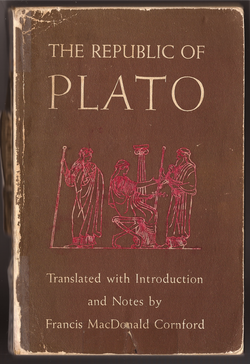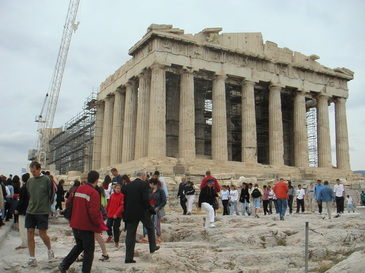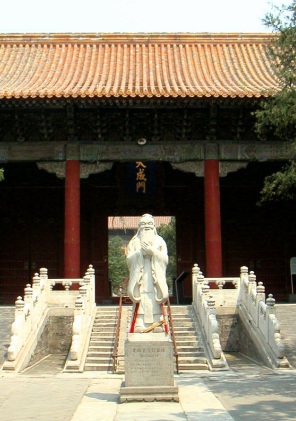
According to the Stanford Encyclopedia of Philosophy, Plato "can be recognized to be far more exploratory, incompletely systematic, elusive, and playful than (other philosophers). That, along with his gifts as a writer and as a creator of vivid character and dramatic setting, is one of the reasons why he is often thought to be the ideal author from whom one should receive one's introduction to philosophy. His readers are not presented with an elaborate system of doctrines held to be so fully worked out that they are in no need of further exploration or development; instead, what we often receive from Plato is a few key ideas together with a series of suggestions and problems about how those ideas are to be interrogated and deployed. Readers of a Platonic dialogue are drawn into thinking for themselves about the issues raised, if they are to learn what the dialogue itself might be thought to say about them. Many of his works therefore give their readers a strong sense of philosophy as a living and unfinished subject (perhaps one that can never be completed) to which they themselves will have to contribute."
It's shocking to me to read that paragraph now and realize that is precisely what happened to me, finally starting my own contributions to philosophy almost 25 years after first confronting these dialogues of Plato with ruminations that were were often preceded by my slamming the book shut to think through his / Socrates' words and then shout my own dialogue replies loudly in my head. I don't mean to dismiss the writings—they stretched my mind deeply in a way that nothing else had before and were therefore utterly fascinating. From the Amazon description of the book, Plato's The Republic is, "widely acknowledged as the cornerstone of Western philosophy. Presented in the form of a dialogue between Socrates and three different interlocutors, it is an inquiry into the notion of a perfect community and the ideal individual within it. During the conversation other questions are raised: what is goodness; what is reality; what is knowledge? The Republic also addresses the purpose of education and the role of both women and men as "guardians" of the people. With remarkable lucidity and deft use of allegory, Plato arrives at a depiction of a state bound by harmony and ruled by philosopher kings." What brash 17 year old about to go off and make his way in the world doesn't wish he could be one of these kings? And maybe even change his republic to accept such a rule?
Alfred North Whitehead, in Process and Reality: An Essay in Cosmology (1929), wrote the often quoted phrase that, "The safest general characterization of the European philosophical tradition is that it consists of a series of footnotes to Plato." Perhaps this is true by default since, once again quoting the Stanford Encyclopedia, "Plato was not the first thinker or writer to whom the word 'philosopher' should be applied, but he was so self-conscious about how philosophy should be conceived, and what its scope and ambitions properly are, that the subject of philosophy, as it is often conceived—a rigorous and systematic examination of ethical, political, metaphysical, and epistemological issues, armed with a distinctive method—can be called his invention." For that invention, we should all be grateful, even if the answers Plato gave to the questions he posed were not always ones that survive the 2400 years of dialogue they spawned among the world's greatest thinkers. Before I sort Plato's main arguments into my Survival of the Fittest Philosophers model, I thought I would share some of his direct quotes. They're wonderful reminders of the beauty of reading philosophy so I think this will become a regular feature of this series. Here goes.
Let every man remind their descendants that they also are soldiers who must not desert the ranks of their ancestors, or from cowardice fall behind.
Death is not the worst that can happen to men.
All knowledge, when separated from justice and virtue, is seen to be cunning and not wisdom; wherefore make this your first and last and constant and all-absorbing aim, to exceed, if possible, not only us but all your ancestors in virtue.
False words are not only evil in themselves, but they infect the soul with evil.
The tools which would teach men their own use would be beyond price.
Wealth is the parent of luxury and indolence, and poverty of meanness and viciousness, and both of discontent.
Democracy is a charming form of government, full of variety and disorder, and dispensing a sort of equality to equals and unequals alike.
Until philosophers are kings, or the kings and princes of this world have the spirit and power of philosophy, and political greatness and wisdom meet in one, and those commoner natures who pursue either to the exclusion of the other are compelled to stand aside, cities will never have rest from their evils — no, nor the human race, as I believe — and then only through this will our State have a possibility of life and behold the light of day.
-----------------------------------------------------------------
Plato (428-348 BCE) was a Classical Greek philosopher, mathematician, student of Socrates, writer of philosophical dialogues, and founder of the Academy in Athens, the first institution of higher learning in the Western world.
Survives
Many have interpreted Plato as stating that knowledge is justified true belief, an influential view that informed future developments in modern analytic epistemology. When beliefs are justified through the scientific method, they can be said to contain current knowledge. Just as the universe is forever changing and evolving, so knowledge may change and evolve. But just as the universe appears stable over many time horizons, so knowledge can also be stable for great lengths of time.
Needs to Adapt
Plato listed a threefold division of philosophy into dialectic, ethics, and physics. Today, there are six branches of Philosophy: Logic, Epistemology, Metaphysics, Ethics, Aesthetics, and Political Philosophy. Physics is one of the many natural sciences.
Virtue is knowledge, the cognition of the supreme form of the Good. Knowledge of what exactly good actions are is necessary for virtue, but actions are what count.
Gone Extinct
Apprehensions derived from the impression of sense can never give us knowledge of true being (the forms) - that can only be obtained by the soul’s activity within itself (reason). Plato’s forms are merely the definitions we create to separate the world into objects of similar qualities. Just because we see categories of things, this does nothing to imply that there are perfect forms of these categories somewhere in the ether. There are no forms, and knowledge is obtained through the combined use of senses and reason.
Plato posited the theory of forms being unchangeable and eternal. Particular objects of sense are imperfect copies. There are no one, perfect, eternal forms. In a universe that is moving and changing, environments change and objects must adapt to new conditions. Diversity is a necessary ingredient in adaptability. There is no perfect “chair." Particular chairs fit their purpose and their environment. These conditions can change, so chairs must too. Plato’s forms are easy to imagine precisely because they are imaginary.
Platonism is a term coined by scholars to refer to the intellectual consequences of denying the reality of the material world. The idea that reality is unavailable to those who use their senses is what puts him at odds with the common man, and with common sense. Socrates says that he who sees with his eyes is blind, and this idea is most famously captured in his allegory of the cave. According to Socrates, physical objects and physical events are "shadows" of their ideal or perfect forms, and exist only to the extent that they instantiate the perfect versions of themselves. Socrates says in the Republic that people who take the sun-lit world of the senses to be good and real are living pitifully in a den of evil and ignorance. Socrates admits that few climb out of the den, or cave of ignorance, and those who do, not only have a terrible struggle to attain the heights, but when they go back down for a visit or to help other people up, they find themselves objects of scorn and ridicule. For good reason. While we may need other instruments in addition to our senses to perceive it, the material world is real. Imagining perfect forms behind the reality of objects is both ignorant of the necessity for diversity and adaptability, as well as damaging to the appreciation of the beauty of existence.
Plato posited a theory of the cosmos as the physical world created using the world of forms as its model. Forms don’t exist. Modern cosmology knows much more than this.
-----------------------------------------------------------------
Do you have your own words to speak in this dialogue? Perhaps you were introduced to Plato in a different though still meaningful way? Share your thoughts below so we can consider them too.




